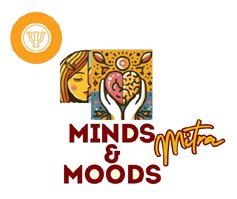Mending the Connection: A Guide to Couple & Relationship Therapy 💑
Couple and relationship therapy is a specialized form of counselling that helps people in a romantic relationship resolve conflicts, improve communication, and strengthen their bond. It’s a proactive step that can be taken at any stage of a relationship, whether you’re navigating a new phase, dealing with persistent issues, or seeking to deepen your connection. A trained psychotherapist, mental health counsellor, or counselling center can provide a neutral and safe space for both partners to voice their concerns and work toward a common goal.
A Trusted Professional in Nagpur: Rrimi Bodalkar
For couples in Nagpur seeking to strengthen their relationship, Rrimi Bodalkar, a Sr. Psychotherapist / Mental Health Counsellor, is a highly qualified professional. Holding an M.A. in Psychology (Counselling) and a PGDMH (Clinical), she has the expertise to address complex relationship dynamics. Her specialization in CBT, REBT & DBT (Specialised) provides her with a powerful set of tools to help couples manage negative thinking patterns, regulate their emotions, and communicate more effectively. As an NSDC Certified professional in Psychometric Analysis & Learning Style Assessment, she is well-equipped to help partners understand each other’s unique psychological makeups, ensuring a more holistic and successful outcome.
When to Seek Help: Symptoms & Causes
It’s a common misconception that couple therapy is only for relationships on the brink of collapse. In reality, it can be a vital tool for preventing issues from escalating. The symptoms that may indicate a need for professional help include:
- Communication Breakdown: Constant arguing, bickering, or a complete lack of effective communication, which can lead to resentment.
- Trust Issues: Dealing with the aftermath of infidelity, financial deception, or other breaches of trust.
- Frequent Conflicts: Recurring fights over the same issues without a resolution. This can also be a sign of a need for individual anger management counselling.
- Emotional Distance: Feeling disconnected from your partner, a lack of intimacy, or a sense of emotional emptiness.
- Major Life Transitions: Navigating significant changes such as a new baby (parenting support counsellor), a job loss (workplace stress counselling), or a geographic move (life transition counselling).
The causes of these issues can be a combination of poor communication skills, unresolved individual issues (personal counselling), a history of trauma impacting one or both partners, or differing values and expectations.
The Procedure of Treatment: A Collaborative Process
The procedure of treatment for couple and relationship therapy is a collaborative and goal-oriented process that focuses on the dynamics between partners.
- Initial Assessment: The therapist will meet with both partners, sometimes individually and sometimes together, to understand the history of the relationship, the presenting issues, and each person’s perspective. The therapist may use a Personality assessment or other Psychometric Analysis tools to understand the unique traits of each partner.
- Identifying Negative Patterns: The therapist helps the couple identify the negative cycles of interaction they are stuck in. For example, one partner may withdraw when the other gets angry, creating a pattern that leads to more conflict.
- Skill Building: The couple learns and practices new, healthier ways of communicating and interacting. This can include:
- Active Listening: Learning to truly hear and understand each other’s perspectives without interruption.
- Emotional Regulation: Using techniques from Cognitive Behavioral Therapy (CBT) or Dialectical Behavior Therapy (DBT) to manage intense emotions during arguments.
- Conflict Resolution: Learning to express needs and concerns in a constructive, rather than destructive, way.
- Rebuilding Connection: The therapist guides the couple in reconnecting on an emotional and physical level, helping them rebuild trust, intimacy, and a sense of partnership. This is a core part of marriage counselling and couple therapy.
Frequently Asked Questions (FAQ’s)
Q1: How is relationship counselling different from individual therapy?
A: Relationship counselling focuses on the dynamic between two people, whereas individual therapy focuses on a single person’s thoughts and behaviors. However, a good therapist will recognize that both are often interconnected.
Q2: Will the counsellor choose a side in our arguments?
A: No. A skilled psychotherapist remains neutral and impartial. Their role is not to assign blame but to help the couple understand their negative patterns and work toward a healthier way of relating to each other.
Q3: Can couple therapy help with anger management?
A: Yes. Many conflicts in relationships are fueled by unmanaged anger. Couple therapy often includes components of anger management counselling to help both partners learn to express their anger in a healthier way.
Q4: Is it a sign of weakness to seek help for my relationship?
A: On the contrary, it’s a sign of strength and commitment. Seeking counselling shows a dedication to your partner and a willingness to put in the work to make the relationship last.
Q5: What if my partner doesn’t want to go to counselling?
A: You can still benefit from personal counselling on your own. A therapist can help you understand your role in the relationship’s dynamics and teach you new communication skills that may still have a positive impact on your partner and the relationship as a whole.

